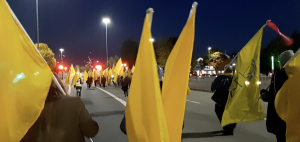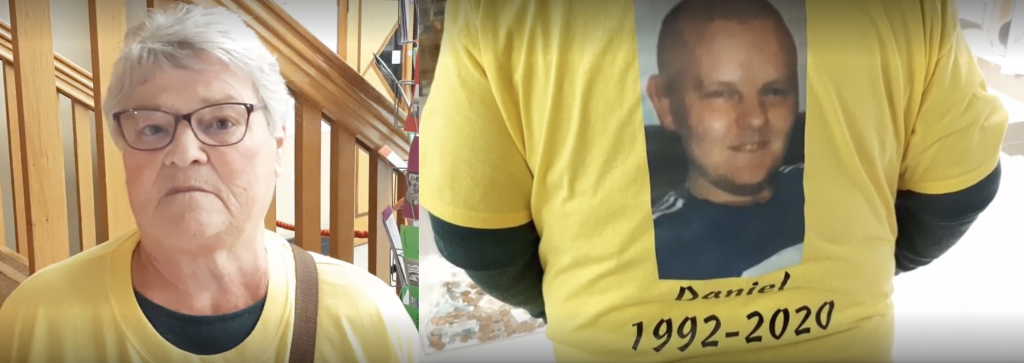The Salford-based suicide prevention charity, Reach Out: Start to End Suicide, held a vigil on Saturday (8th October) in memory of those who have lost their lives to suicide this year.
The event organiser, Dennis Baldwin, spoke about what the day represented. He said: “It’s not a tangible output, it’s a feeling and an emotion and it inspires conversation.
“It’s those conversations that ensures people have the support that they need. And a lot of times it’s the only time [people] get to talk about that loved one.”
The procession involved attendees holding up yellows flag for each life lost to suicide in the last five years in Salford. Its aim was to better equip people with the confidence to speak about suicide and hopefully contribute to Salford’s ‘Zero Suicide’ ambition.
Dennis continued: “We always set out, with the flags, to have participants rather than casual observers, so that they actually become part of the event
“We had 126 [flags] this year because that’s how many lives we’ve lost over the last 5 years to suicide. It’s about the symbolism, its about people carrying that flag for a loved one they’ve lost.”
Unfortunately, the event was delayed due to the death of Queen Elizabeth II but managed to go ahead without issue on Saturday at Salford Museum & Art Gallery, two days before National Mental Health Awareness Day 2022.
This year’s event aims to spotlight the effect of the cost of living crisis has on peoples mental health.

Paul Dennett, the Mayor of Salford, said: “The cost of living crisis is real. We’re seeing rising prices but wages are stagnating. As a consequence people are inevitably being pushed further and further into poverty.
“Tackling that crisis, but also campaigning to put pressure on the government to take the cost of living crisis seriously is really important.
“We know this crisis is exacerbating mental health issues, forcing people to choose between heating and eating… So, yes, we are in the middle of cost of living crisis but my plea is for us to all to work together to look after one another.”
Before the pandemic started, nearly one third of Salford’s population was living in on the most deprived LSOA (Lower Super Output Area) in England. 9% of working Salford residents said they had lost their job or been made redundant as of November 2020.
Salford also has the second highest rate of children living with three major risk factors (domestic abuse, substance misuse and severe mental health problems) in Greater Manchester – equating to roughly 4 children in every class of 30. This childhood trauma can have a major impact on young adults who must navigate conditions like depression, anxiety and eating disorders on top of stress caused by financial instability.
Beverly Hockenhull lost her grandson, Daniel, two years ago to suicide. She said: “There’s no support there. Even tonight they mentioned support but the waiting lists are horrendous. And it’s going to be a hell of lot worse because of the cost of living.
“He was only 28 when he passed. Even though Daniel suffered from mental health issues for the last 10 years of his life, every November there just seemed to be an issue.”
Salford and Eccles North CLP, Rebecca Long-Bailey’s address at the vigil #SuicidePreventionDay, yesterday @ Salford Museum, remembering 126 lives lost in Salford the last 5 years. pic.twitter.com/fQbaFoDMxI
— Yolande Noelle (@gholy17) October 9, 2022
Rebecca Long Bailey, MP for Salford and Eccles also spoke at the event. She said: “Mental health has been in crisis across Salford for year’s now. It’s not giving the same parity of esteem as physical health, meaning people can’t access the care they need, particularly that immediate support.
“There’s not enough investment going into schools to help young people in early intervention.
“We’ve got amazing services and amazing volunteers but they’re working every hour god sends and they don’t have enough funding from government and they really needs to change.”
If you have struggled with mental health issues and require support you can contact the Samaritans’ 24 hour service 116 023 at any time.















Recent Comments